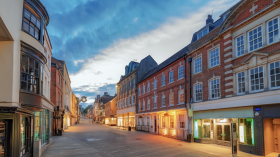£5.5bn needed to level up access to urban green space
A number of figures and organisations have written to the Prime Minister urging for a £5.5 billion commitment to an urban green infrastructure fund to level up access to urban green space.
The National Trust, the Mayor of the West Midlands, Sustrans, Create Streets and local council leaders point to new research, by Vivid Economics and Barton Wilmore, which makes a powerful economic case for such a significant investment across the UK in greening the country’s most left behind and greyest urban communities over the next five years.
The huge surge in people’s use of parks and green spaces during the coronavirus pandemic - up 25 per cent this May compared to May 2018 and nearly doubling over the last decade from 1.2 billion visits in 2009-10 to 2.1 billion in 2018-19 - and the significant inequality of provision exposed by the crisis shows a need for urgent investment in greening neighbourhoods, towns and cities.
They argue that this green infrastructure investment would bring an impressive £200 billion in physical health benefits through disease prevention and mental well-being benefits to alleviate some of the strain on local health service providers and to improve people’s quality of life.
Greening neighbourhoods, towns and cities brings a host of wider benefits to people’s lives, improving air quality, reducing summer temperatures and surface flooding, and making cycling and walking even more attractive. It will also help make cities and towns resilient to climate change and achieve net zero ambitions, with this scale of investment delivering one in 12 of the UK’s tree planting target. Research on London’s green spaces showed for every £1 councils spent on looking after parks, £27 in value was generated for people.
However, the coronavirus pandemic has also exposed deep inequalities in access to green space. The research finds that 295 deprived neighbourhoods of 440,000 people are grey deserts, with no trees or accessible green space. Additionally, in areas where over 40 per cent of residents are from ethnic minorities, there is 11 times less public green space than in areas where residents are largely white, and it is also likely to be of poorer quality. Meanwhile, black people are four times less likely than white people to have a private garden.
Andy Street, the Mayor of West Midlands says: “We are immensely proud of our green spaces here in the West Midlands, and we have fought tremendously hard to keep them – particularly when it comes to housebuilders eyeing up our greenbelt land. The coronavirus pandemic has shown us just how important these spaces are, not just for physical well-being but also for people’s mental health as well. Because of this there is now real potential to achieve bold, green, change in the next few years, and this must be at the forefront of the government’s mind as it begins to draw up recovery plans for the country.
“Here in the West Midlands we have big ambitions for a new kind of National Park to unite the people of the West Midlands with their landscape and shared heritage. We want to connect our dense grey areas with surrounding green acres, create new urban greenspace, cycle routes, and wildlife-rich areas across all our towns and cities. Whether it is getting more people moving to tackle high-levels of obesity, or planting more trees to help us reach our climate change targets, an urban national park is an innovative idea that would make a significant difference to our region.”
Marvin Rees, Mayor of Bristol, said: “We know how vital parks and urban green spaces have always been to the health and well-being of Bristol communities, and especially during the pandemic. The use of them has shot up as they have become part of the people’s daily routine for walks and family bike rides, the neighbourhood gym, a place for socialising once lockdown restrictions eased and a therapeutic escape for us all.
“Whilst Bristol prides itself as a green city, not everyone can see a tree from their window, not all of us have easy access to brilliant parks, not every child can experience the joy of the natural world. We are changing that inequality through our city’s recovery plan. It will put green and liveable neighbourhoods at the centre, empowering our communities to bring trees, nature and aspiration into their streets and shared spaces.
“We have exciting plans to create new city centre parks and turn some of our car parks into new beautiful green spaces, like in Paris. We also have ambitious plans to transform and connect the city’s network of green spaces, working with business and community partners. But we need investment to unlock this potential and kick start our green recovery.”
Hilary McGrady, Director-General of the National Trust, added: “We are calling for a major collaborative effort – for national government, local councils, charities, businesses, communities and funders across our cities and towns to work together in new ways to bring nature and beautiful green spaces into everyone’s lives. Everyone needs access to natural beauty for their well-being. It’s the very foundations on which the Trust was built, and we want to live up to that ambition by supporting partners, projects and innovations that can deliver this humble but inspiring benefit to millions more people.
“Now is the time for government to be bold and ambitious for the future, investing in the upgrade, extension and connection of the vital green infrastructure of towns and cities, just as it is doing for transport infrastructure. The Prime Minister could lead a transformation that enables all urban dwellers to live with beauty; a gift of renewal and hope comparable to the post-war creation of the nation’s great rural National Parks and its urban green belts.”







